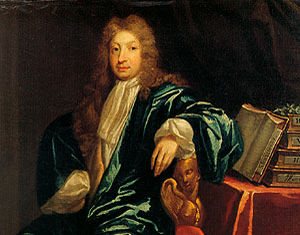Frases célebres de John Dryden
John Dryden Frases y Citas
John Dryden: Frases en inglés
“With how much ease believe we what we wish!”
Cleopatra in Act IV, scene I
All for Love (1678)
“Of ancient race by birth, but nobler yet
In his own worth.”
Pt. I, lines 900–901.
Absalom and Achitophel (1681)
“War seldom enters but where wealth allures.”
Pt. II, line 706.
The Hind and the Panther (1687)
“Too black for heav'n, and yet too white for hell.”
Pt. I, line 343.
The Hind and the Panther (1687)
“Behold him setting in his western skies,
The shadows lengthening as the vapours rise.”
Pt. I line 268.
Absalom and Achitophel (1681)
“The fool of nature stood with stupid eyes
And gaping mouth, that testified surprise.”
Fuente: Fables, Ancient and Modern (1700), Cymon and Iphigenia, Line 107.
“Large was his wealth, but larger was his heart.”
Pt. I, line 826.
Absalom and Achitophel (1681)
“Never was patriot yet, but was a fool.”
Pt. I, line 967.
Absalom and Achitophel (1681)
“Possess your soul with patience.”
Pt. III, line 839.
The Hind and the Panther (1687)
“The true Amphitryon is the Amphitryon where we dine.”
Amphitryon (1690), Act IV scene i.
“Better one suffer, than a nation grieve.”
Pt. I line 416.
Absalom and Achitophel (1681)
“Whate’er he did was done with so much ease,
In him alone 't was natural to please.”
Pt. I line 27-28.
Absalom and Achitophel (1681)
“Truth is the foundation of all knowledge, and the cement of all societies.”
The Character of Polybius (1692)
“For present joys are more to flesh and blood
Than a dull prospect of a distant good.”
Pt. III, lines 364–365.
The Hind and the Panther (1687)
“Happy who in his verse can gently steer
From grave to light, from pleasant to severe.”
The Art of Poetry, canto i, line 75.
Bartlett's Familiar Quotations, 10th ed. (1919)
Fuente: Alexander’s Feast http://www.bartleby.com/40/265.html (1697), l. 37–41.
Aeneis, Book VI, lines 192–195.
The Works of Virgil (1697)
“Fame then was cheap, and the first comer sped;
And they have kept it since by being dead.”
Epilogue.
The Conquest of Granada (1669-1670)
“For truth has such a face and such a mien
As to be loved needs only to be seen.”
Pt. I, lines 33–34.
The Hind and the Panther (1687)
“The soft complaining flute,
In dying notes, discovers
The woes of hopeless lovers.”
St. 4.
A Song for St. Cecilia's Day http://www.englishverse.com/poems/a_song_for_st_cecilias_day_1687 (1687)
Fuente: Alexander’s Feast http://www.bartleby.com/40/265.html (1697), l. 57–60.
